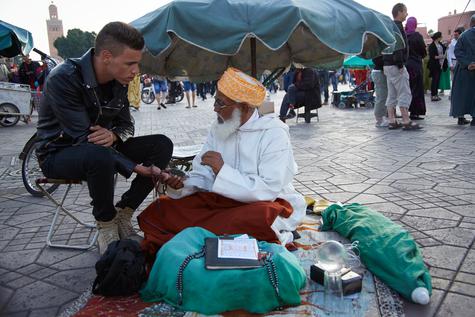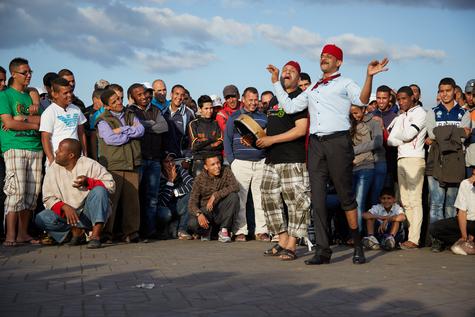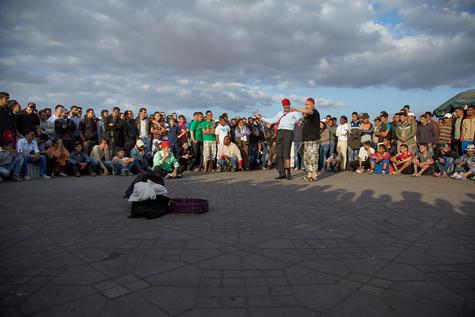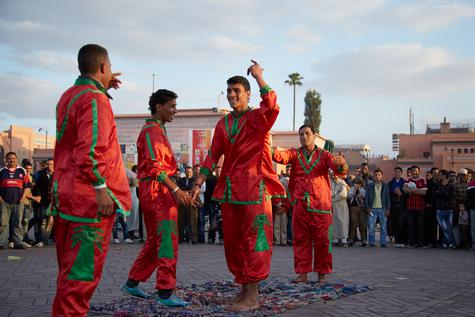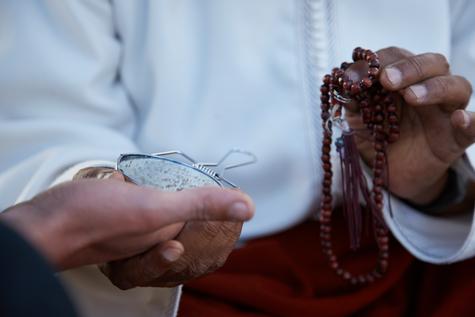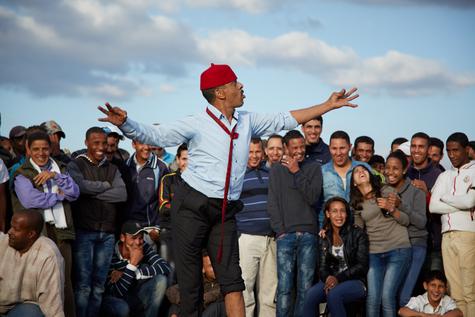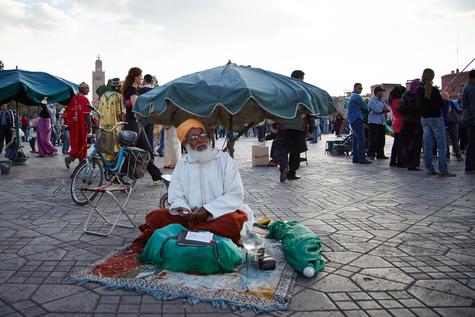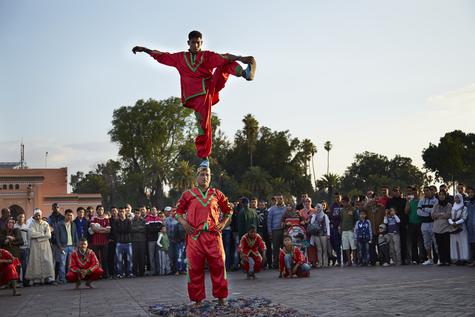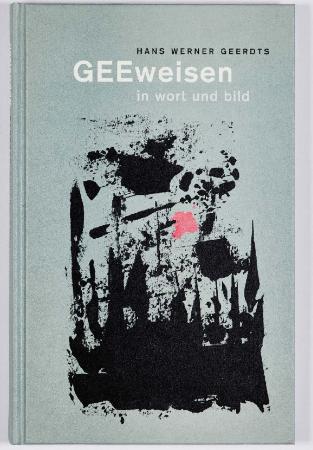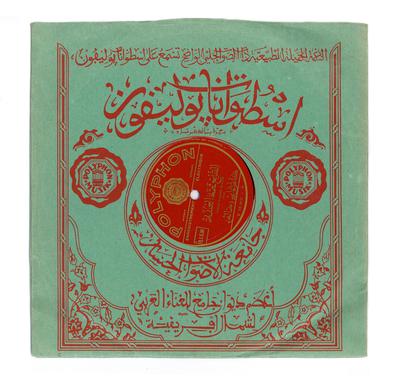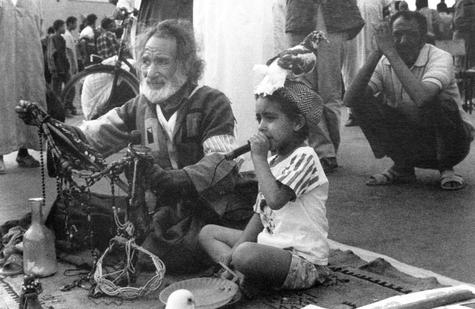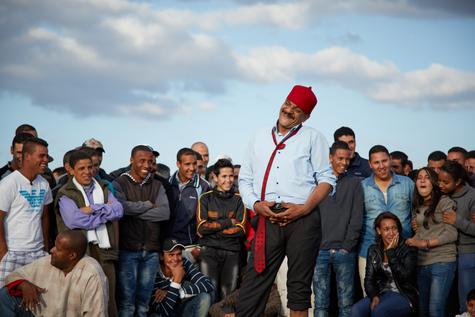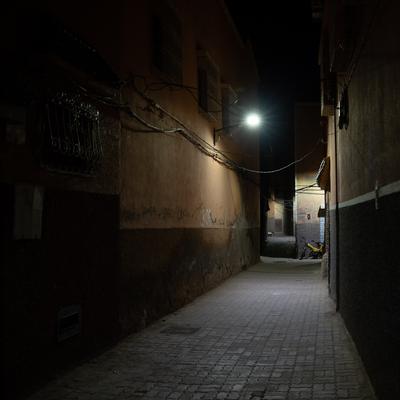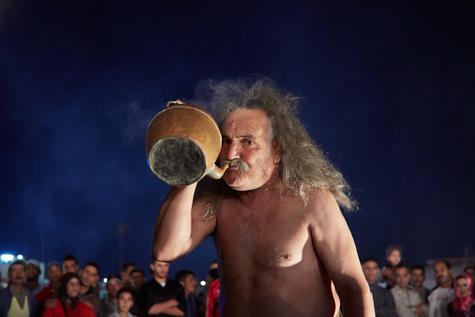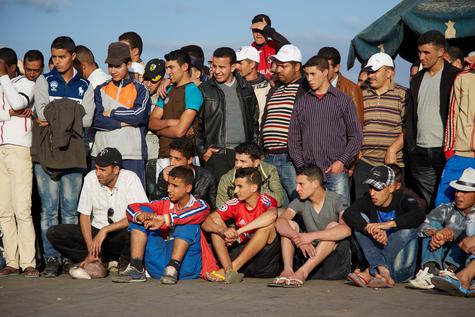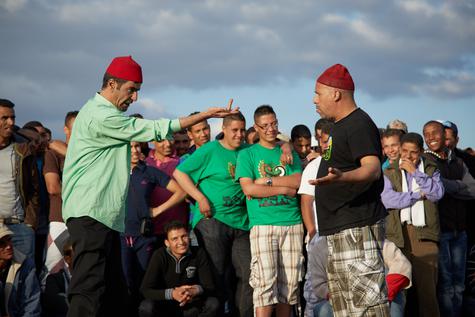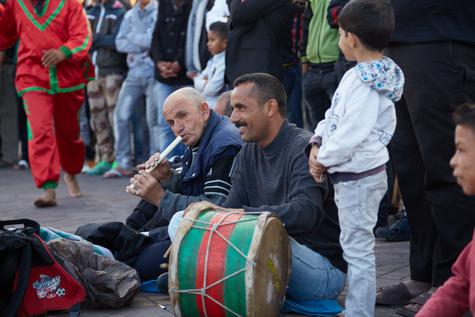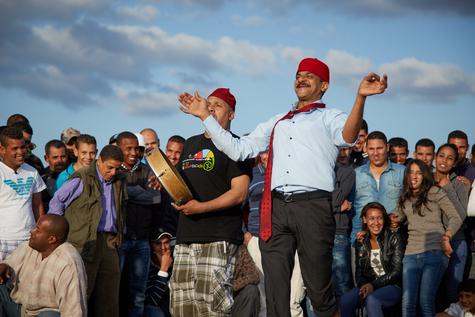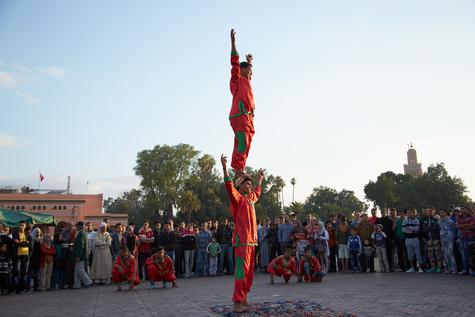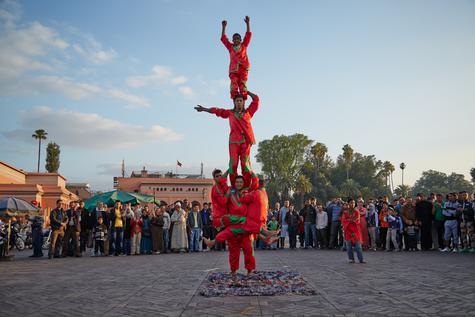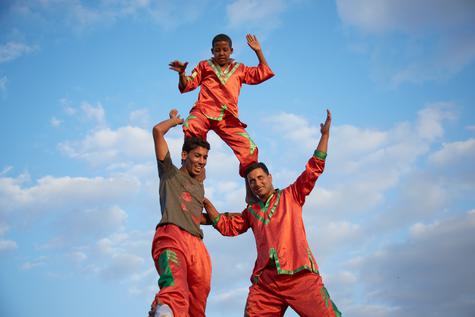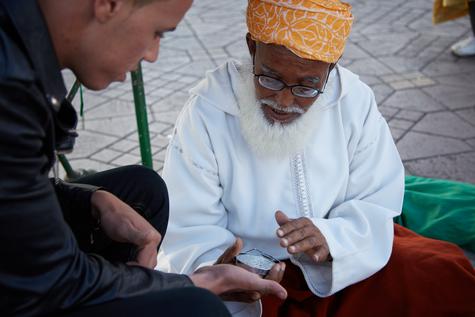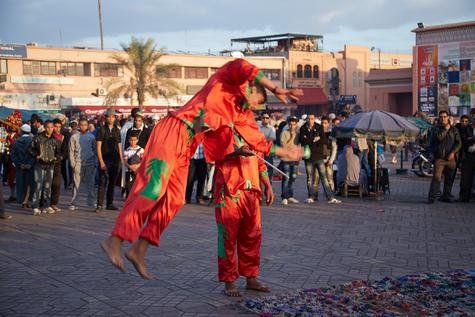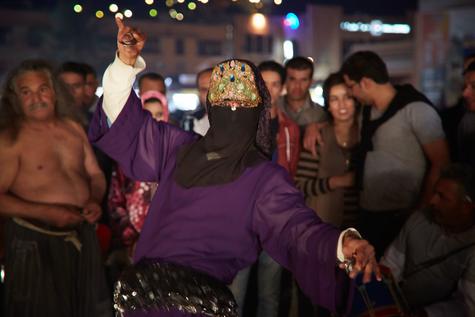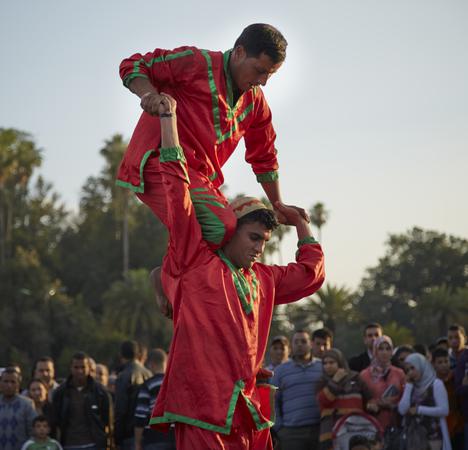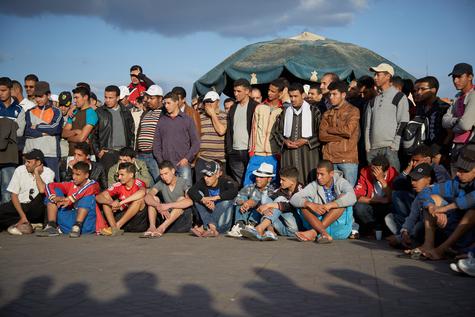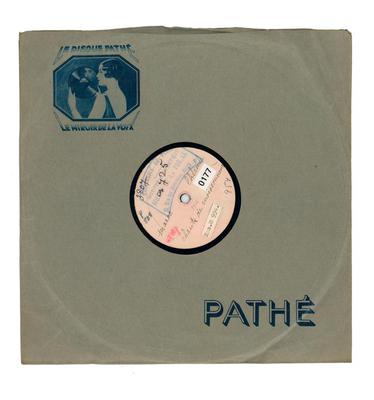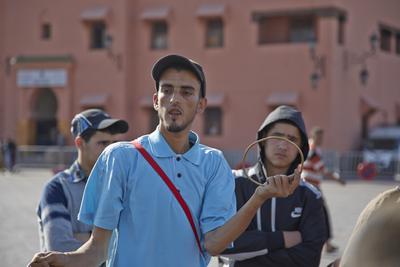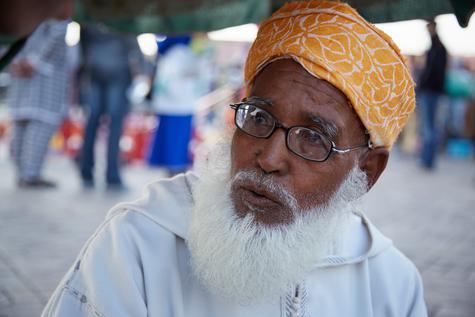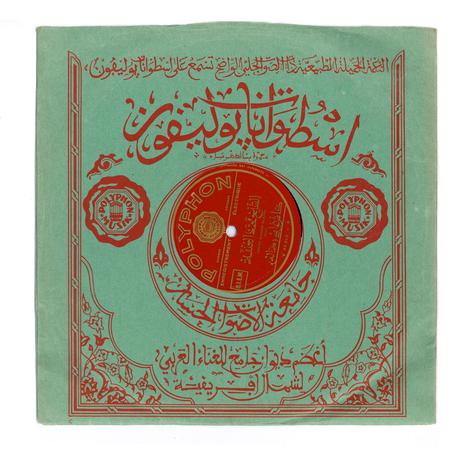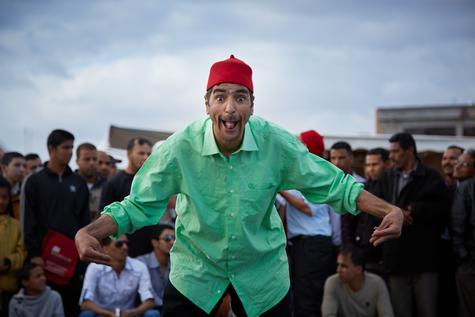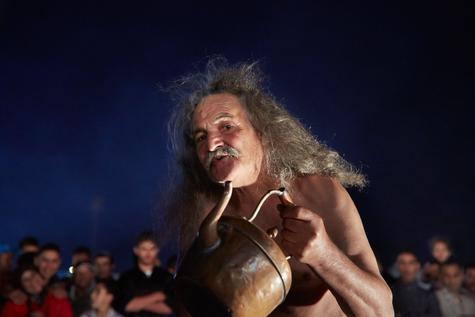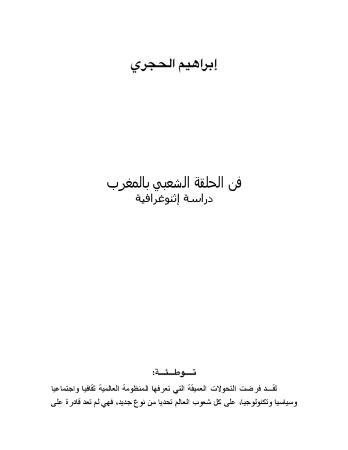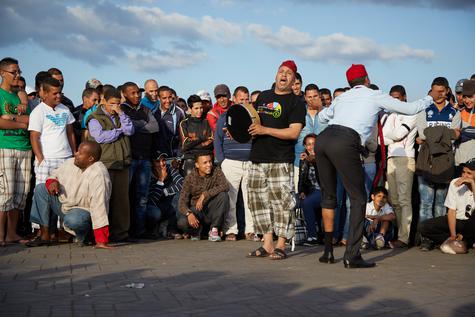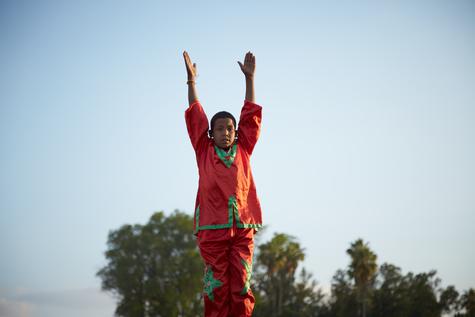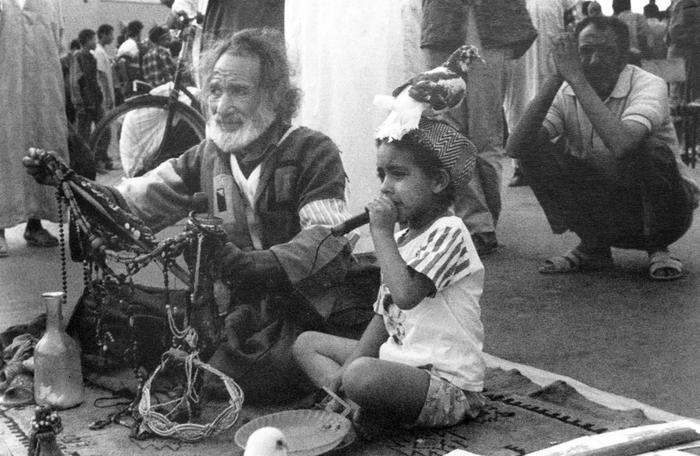
Picture - Ahmed Cherkaoui - "Moul Hamam"
EN:With his pigeon halqa, Ahmed Cherkaoui was one of the most famous personalities on Jemaa El Fna Square. He knew how to make himself immortal in the history of the hlaiqi.
He was a master of words. He knew all proverbs and his speech was well chosen and refined. He was weaving his words with wit, charm, ploy and frivolity. No one else was able to replace him.
He was a master of words. He knew all proverbs and his speech was well chosen and refined. He was weaving his words with wit, charm, ploy and frivolity. No one else was able to replace him.
Ahmed Cherkaoui, also called "Moul Hamam" (The one with the pigeons), was originally from the region of Kasbah Tadla, more precisely from the city Abi Jaad.
His father Mohamed Ben El Haj Cherkaoui (the name goes back to the saint Sidi Bou Abid Cherki) fled Abi Jaad due to hunger, poverty and the colonization of the French.
He also fled, since he feared a vengeance murder by another family. He went to Marrakech and worked as saddler. Shortly after, the father died and the family had to face poverty again.
In order to distract himself, the young Cherkaoui, who was still a child, frequently went to Jemaa El Fna Square and was consumed by its fascination and his hlaiqi.
He enjoys the freedom and independence that the hlaiqi had with their work. Before he was 11 years old, he decided to go on peregrination with his friends in order to learn the craft of an hlaiqi. 4 years later, he returned matured. He became a master of word construction.
His spot on Jemaa El Fna Square was just next to the mosque Cherbouche, right across Café France. His performance would always start with poems from the "Sheik of the Mad", Abderahman El Majdoub. Then, he would continue in rhyme with legends and fairy tales, accompanied by the rhythmic play on his Da'dua - a big drum, similar to a derbuka.
Example of his halqa:
"I advise you: eat the meat from the head and throw the bones in the well. Play and laugh with the people and tame your mouth. Do not think too much and do not ponder too much. Don't let anything grieve you. No day is like the other. Life does not last forever."
His words had a great appeal by his audience, who generously remunerated him. In order to make his halqa special, he borrowed different extras, like a drum for example.
That was even before the pigeons became an important element in his halqa, which later gave him the name "Master of pigeons".
The pigeons were trained well enough to follow his orders. For example if he told them to fly on the roof of the police station, they would follow his orders. A few minutes later, after taking several drags from his water pipe, he called them back with a whistle.
Later, he worked with El Maati Bel Feida, his blind assistant.
They both lived in Derb Kesdir, in the Moqf area, one of the oldest quarters of the city.
Although he bestowed many people with joy and managed to bring a smile in their faces, he died in poverty, consumed by his illnesses.
His father Mohamed Ben El Haj Cherkaoui (the name goes back to the saint Sidi Bou Abid Cherki) fled Abi Jaad due to hunger, poverty and the colonization of the French.
He also fled, since he feared a vengeance murder by another family. He went to Marrakech and worked as saddler. Shortly after, the father died and the family had to face poverty again.
In order to distract himself, the young Cherkaoui, who was still a child, frequently went to Jemaa El Fna Square and was consumed by its fascination and his hlaiqi.
He enjoys the freedom and independence that the hlaiqi had with their work. Before he was 11 years old, he decided to go on peregrination with his friends in order to learn the craft of an hlaiqi. 4 years later, he returned matured. He became a master of word construction.
His spot on Jemaa El Fna Square was just next to the mosque Cherbouche, right across Café France. His performance would always start with poems from the "Sheik of the Mad", Abderahman El Majdoub. Then, he would continue in rhyme with legends and fairy tales, accompanied by the rhythmic play on his Da'dua - a big drum, similar to a derbuka.
Example of his halqa:
"I advise you: eat the meat from the head and throw the bones in the well. Play and laugh with the people and tame your mouth. Do not think too much and do not ponder too much. Don't let anything grieve you. No day is like the other. Life does not last forever."
His words had a great appeal by his audience, who generously remunerated him. In order to make his halqa special, he borrowed different extras, like a drum for example.
That was even before the pigeons became an important element in his halqa, which later gave him the name "Master of pigeons".
The pigeons were trained well enough to follow his orders. For example if he told them to fly on the roof of the police station, they would follow his orders. A few minutes later, after taking several drags from his water pipe, he called them back with a whistle.
Later, he worked with El Maati Bel Feida, his blind assistant.
They both lived in Derb Kesdir, in the Moqf area, one of the oldest quarters of the city.
Although he bestowed many people with joy and managed to bring a smile in their faces, he died in poverty, consumed by his illnesses.

